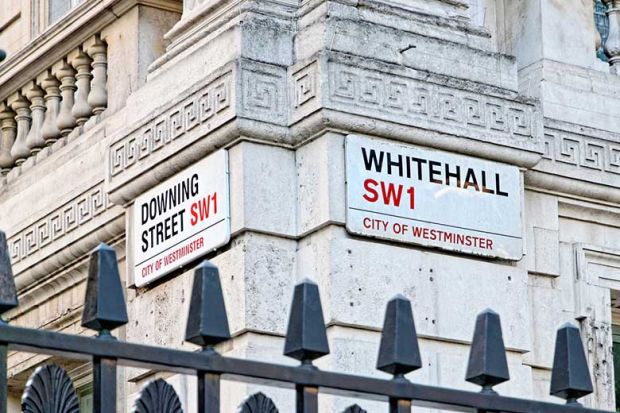The Westminster government has published a “restructuring regime” detailing conditions for English universities seeking emergency loans as a result of the coronavirus crisis – spelling out its aim to use the regime to drive changes in all universities, including a shift towards science courses, greater emphasis on graduate outcomes and potential mergers.
The plans will raise fears among universities about potential threats to their autonomy and potential wider alarm about the intensely political nature of the issues raised in the restructuring document, which include a focus on topics popular on the cultural right, such as campus free speech and “niche activism” among students’ unions.
The Department for Education document, published on 16 July, makes clear that there will be “a clear economic and value for money case for intervention: not all providers will be prevented from exiting the market”.
And support, in the form of a repayable loan, will be granted only on the decision of the education secretary, who will “draw on” the expertise of an “independently chaired Higher Education Restructuring Regime Board composed of external experts”.
But the document goes far beyond emergency loans for institutions at risk of failure, making clear that it is setting out the strategy for what the government wants from all universities: “The principles set out in the Restructuring Regime represent a sound set of principles for all higher education providers.”
Sector sources had been expecting a higher education “strategy paper” from the government, potentially to feed into a wider skills White Paper that elaborates on the government’s planned “rebalancing” to further education – and the “restructuring regime” document appears to be that paper.
The document sets out detail on the policy direction plotted by universities minister Michelle Donelan and education secretary Gavin Williamson, who have both made speeches that appear to set out a goal to reduce the number of students entering higher education, and instead prioritise the creation of a “German-style” further education system.
The document says the restructuring regime will have the aims of “protecting the welfare of current students”, “preserving the sector’s internationally outstanding science base” and “supporting the role that higher education providers play in regional and local economies through the provision of high quality courses aligned with economic and societal needs”.
Emergency loans will be considered only where a university’s financial problems “are related to Covid-19 and there is a clear and sustainable model for future provision as a result of restructuring, meaning that the provider should not need further assistance”.
“The conditions imposed as part of the Restructuring Regime will be designed to ensure those providers make changes that will enable them to make a strong contribution to the nation’s future,” the document says, continuing the government’s emphasis on graduate employment and earnings outcomes.
“We need a future HE sector which delivers the skills the country needs: universities should ensure courses are consistently high quality and focus more heavily upon subjects which deliver strong graduate employment outcomes in areas of economic and societal importance, such as STEM, nursing and teaching. Public funding for courses that do not deliver for students will be reassessed.”
The paragraph on conditions adds that “all universities must, of course, demonstrate their commitment to academic freedom and free speech, as cornerstones of our liberal democracy”.
In terms of detail on free speech, the document does not go beyond highlighting existing legislation, in saying the government would “require assurance that providers are fully complying with their legal duties to secure freedom of speech under section 43 Education (No. 2) Act 1986”.
The next paragraph says: “The funding of student unions should be proportionate and focused on serving the needs of the wider student population rather than subsidising niche activism and campaigns.”
It adds: “Vice-chancellor pay has for years faced widespread public criticism. And while excessive levels of senior executive pay may have been the focus of criticism, equally concerning is the rapid growth over recent decades of spending on administration more broadly, which should be reversed.”
The document spells out the changes the government wants to see in all universities, not just those that might receive emergency loans, noting that some universities will not need emergency support “but will nevertheless be looking to undergo their own restructuring to ensure they are better suited for the post-Covid world”.
“For some providers, this may mean maximising the potential for digital and online learning that the crisis has revealed to increase accessibility and rejuvenate their international offering…In every case this [restructuring] must involve a much stronger alignment of the courses delivered with the economic and societal needs of the nation, in a way that ensures all graduates benefit from their studies.”
The document states which areas the restructuring plans submitted by universities would need to focus on, including course provision and “refocusing provision on high-quality courses, defined as courses with strong learner outcomes (eg, low dropout rates and large proportions of graduates finding highly skilled employment) that develop skills that are aligned to local and national economic and social employment needs”, and also “examining whether any provision could be more effectively offered at Level 4 and 5, either at the institution or at a local FE college”.
Another area of focus will need to be “efficiency”, where the DfE refers to “reviewing administration costs, including but not limited to senior executive pay, identifying cost savings and efficiencies to ensure future sustainability; selling or repurposing assets to repay loans or fund restructuring; closing unviable campuses and considering options for merger, consolidation and service sharing, including with FE”.
The DfE also refers to “strengthening governance and leadership” in this section.
The document makes clear that the regime will be “DfE led”, with the Office for Students, the sector regulator, receiving only glancing mentions.
Iain Mansfield, the former DfE civil servant and head of education at right-wing thinktank Policy Exchange, who is now Mr Williamson’s special adviser, is likely to have been a key figure in the preparation of the restructuring regime document.
The Conservatives’ priorities in education policy have dramatically shifted following changes in their political support post-Brexit vote, with the party increasingly drawing on non-graduate voters in town seats where there are more likely to be further education colleges than universities.
Register to continue
Why register?
- Registration is free and only takes a moment
- Once registered, you can read 3 articles a month
- Sign up for our newsletter
Subscribe
Or subscribe for unlimited access to:
- Unlimited access to news, views, insights & reviews
- Digital editions
- Digital access to THE’s university and college rankings analysis
Already registered or a current subscriber? Login







